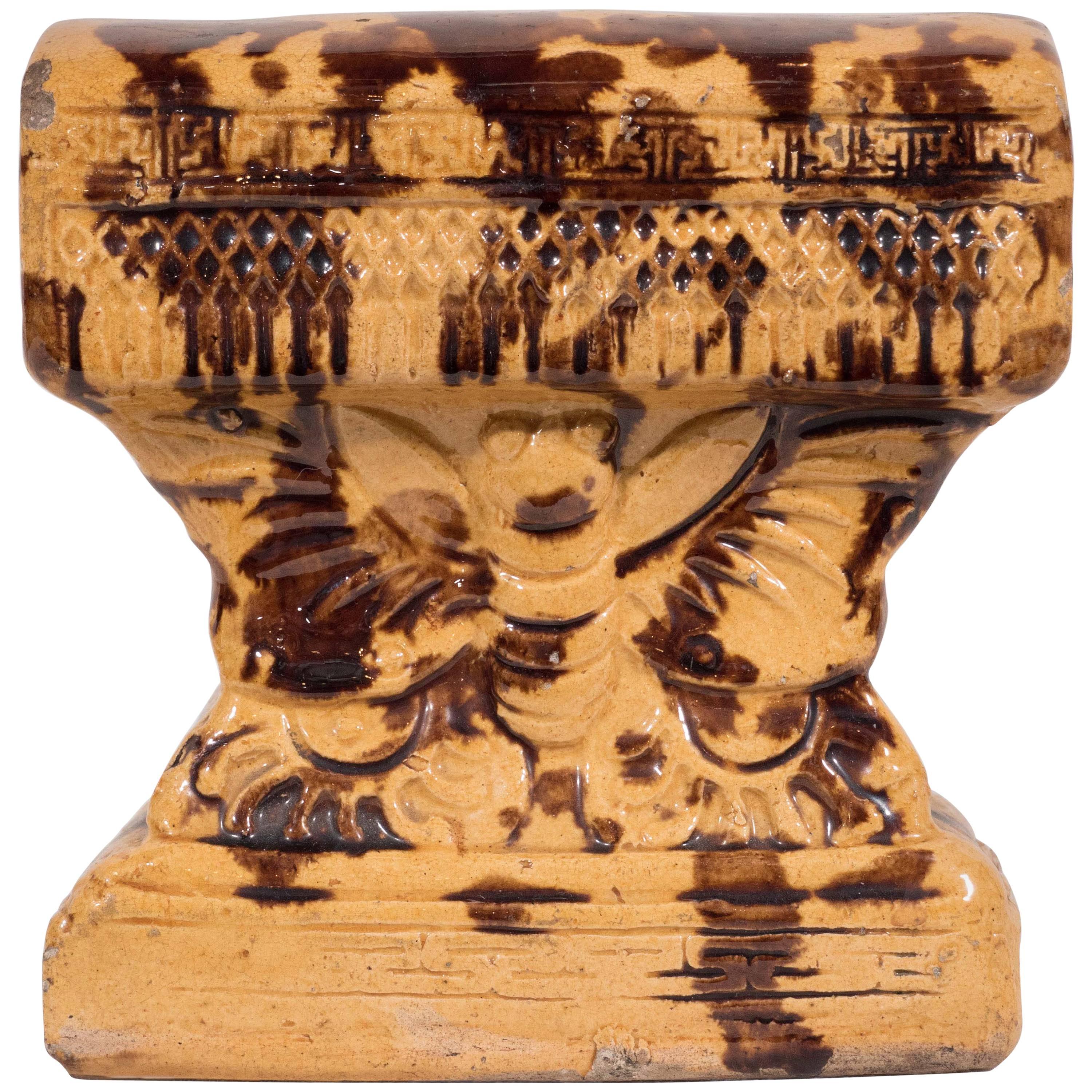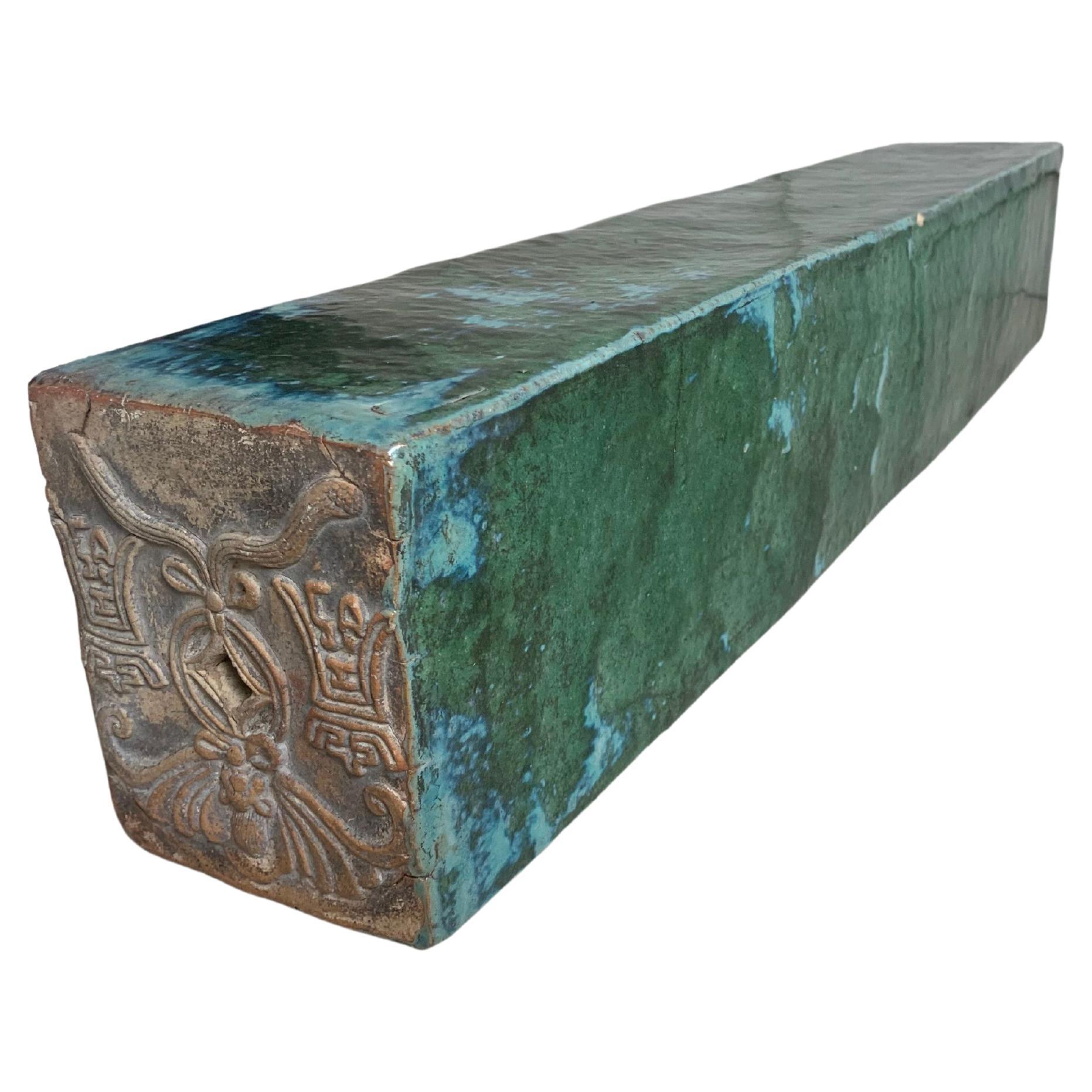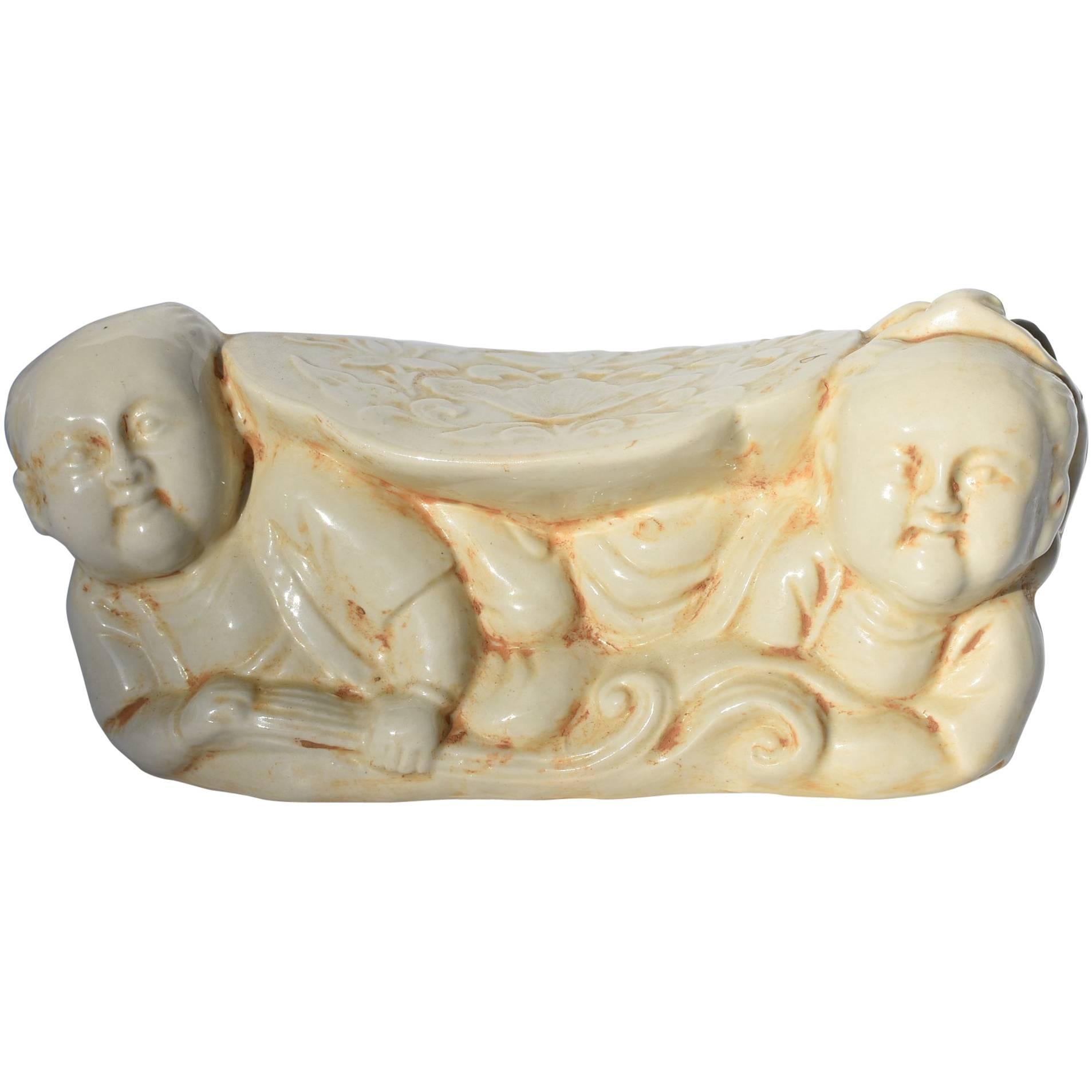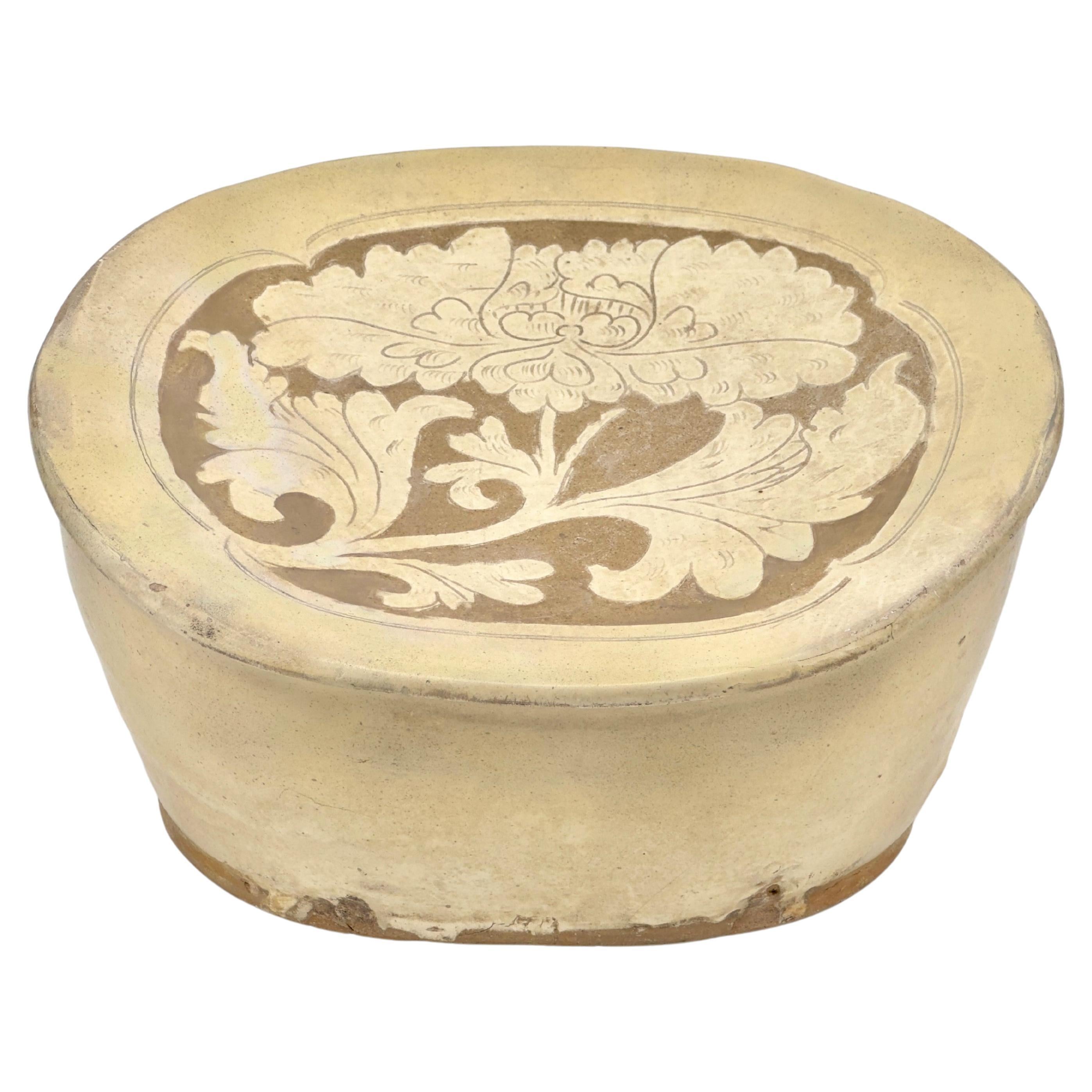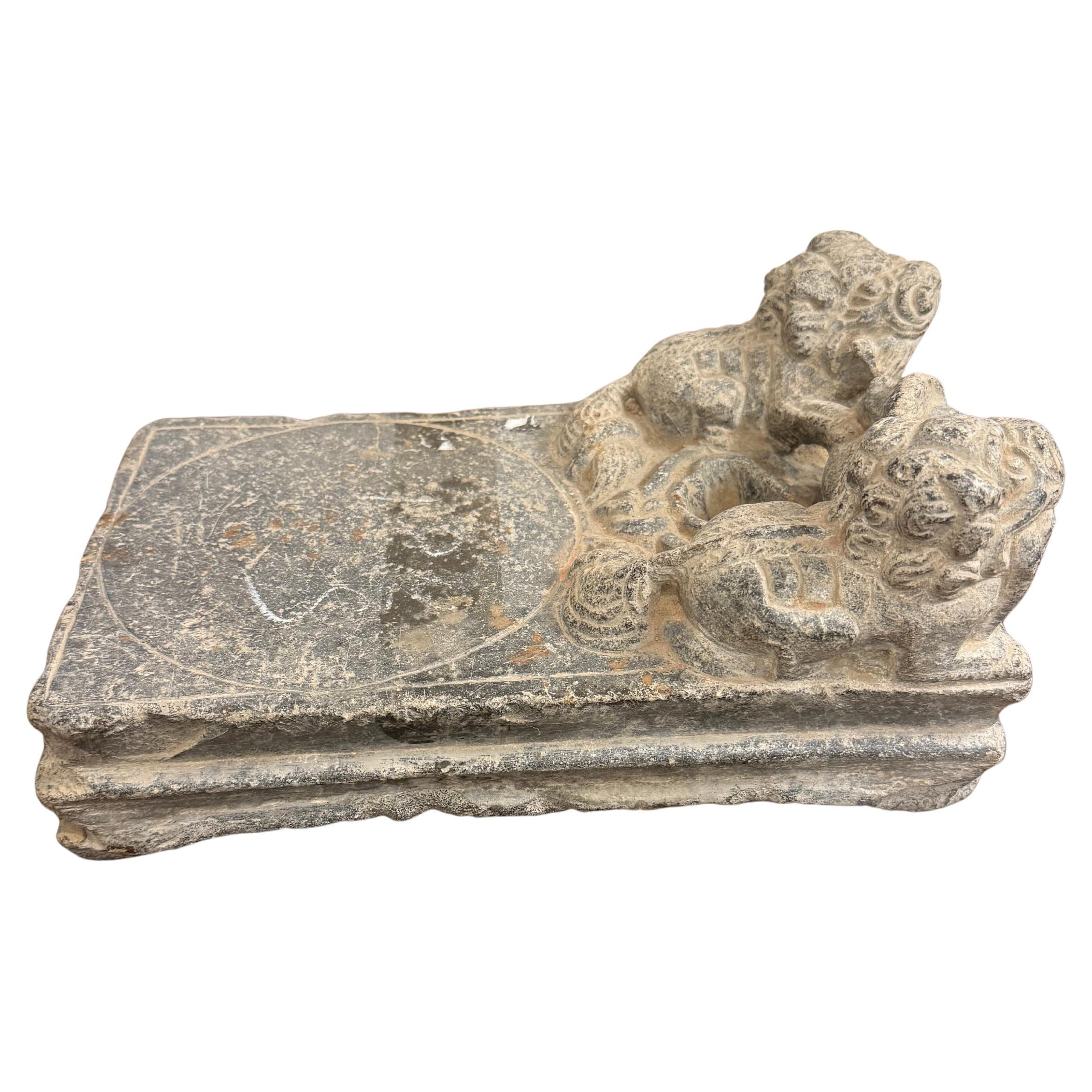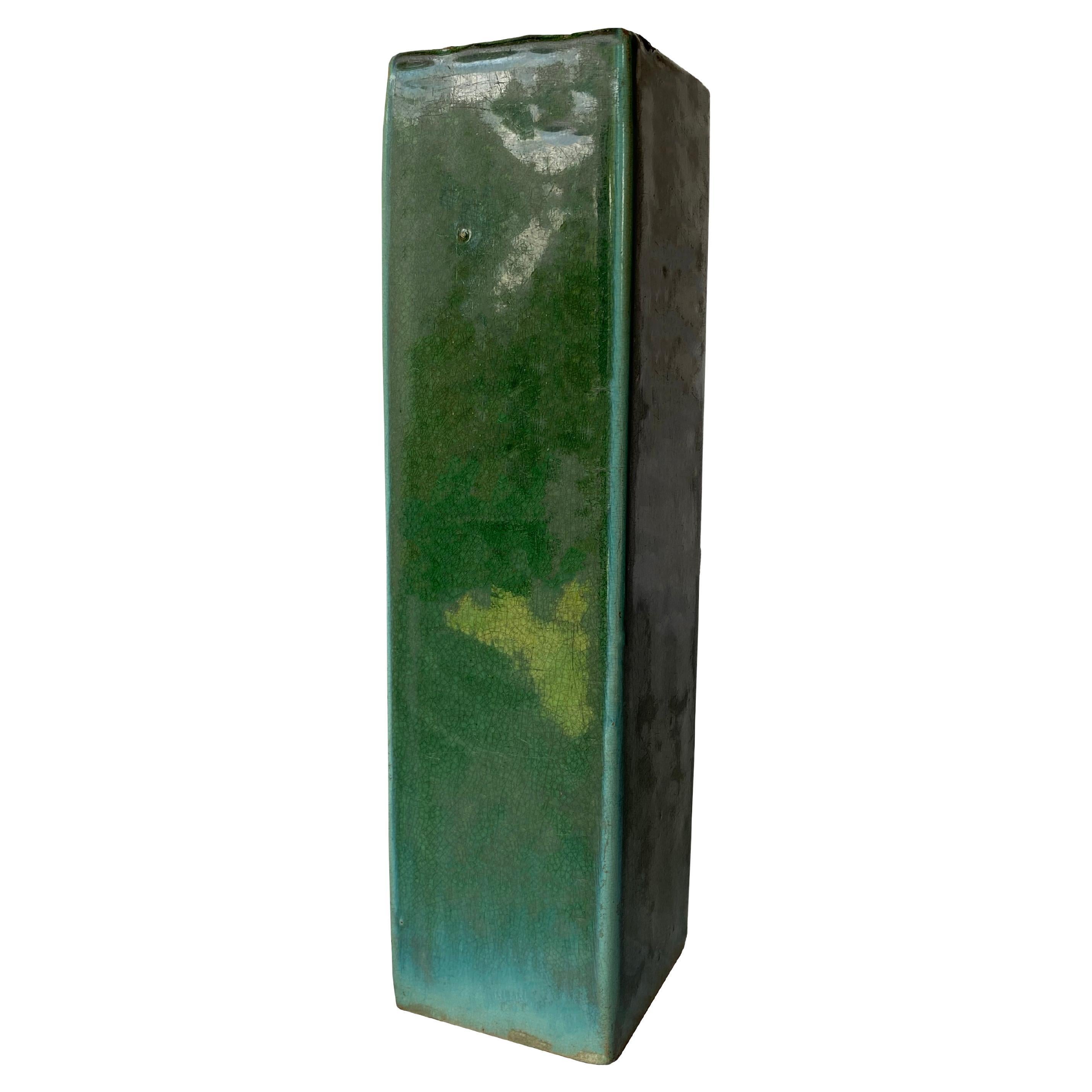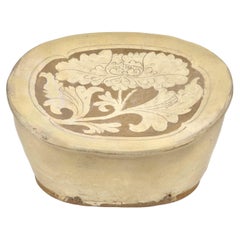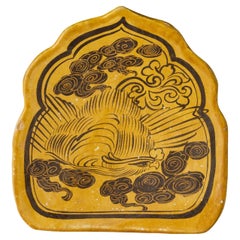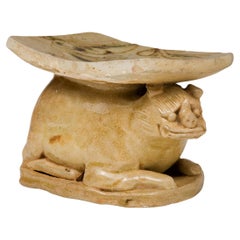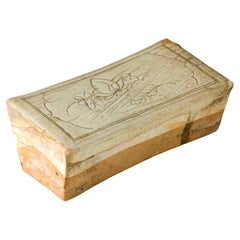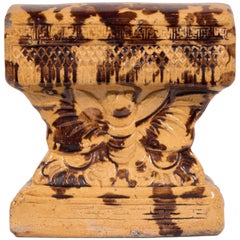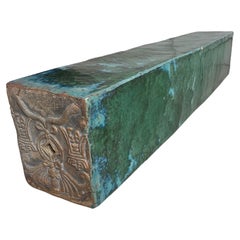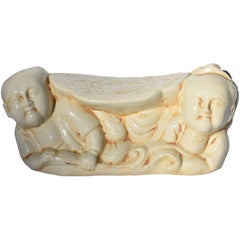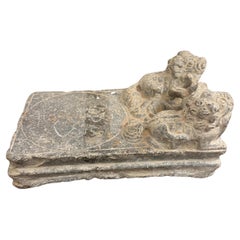Items Similar to A Sancai-glazed pottery 'Haitai' Pillow, Tang dynasty
Want more images or videos?
Request additional images or videos from the seller
1 of 6
A Sancai-glazed pottery 'Haitai' Pillow, Tang dynasty
$2,950
$5,90050% Off
£2,238.39
£4,476.7850% Off
€2,559.40
€5,118.8050% Off
CA$4,120.35
CA$8,240.7050% Off
A$4,581.27
A$9,162.5450% Off
CHF 2,392.09
CHF 4,784.1750% Off
MX$55,765.20
MX$111,530.3950% Off
NOK 30,521.97
NOK 61,043.9450% Off
SEK 28,597.63
SEK 57,195.2650% Off
DKK 19,101.28
DKK 38,202.5650% Off
Shipping
Retrieving quote...The 1stDibs Promise:
Authenticity Guarantee,
Money-Back Guarantee,
24-Hour Cancellation
About the Item
The pillow is intricately decorated with a vibrant pattern, demonstrating the craftsmanship and artistic sensibilities of the period. The Haitai is a creature from Chinese mythology, often considered a symbol of power and authority. Such pillows were popular among the elite class of the time and may have been made for decorative purposes or actual use.
The body of the pillow is sculpted to resemble the body of the Haitai, which relates to the then-common belief that such images could induce good dreams and ward off nightmares.
Date : Tang Dynasty
Made in : Henan province
Provenance : Acquired in 1999, Hongkong
Reference : Sotheby's Hongkong 28 July 2022 - Chinese Art Online: A Private Asian Collection - Lot3081
* Tang Dynasty San-cai
Tang Sancai glazed pottery refers to a type of Chinese ceramic that became famous during the Tang Dynasty. "Sancai" translates to "three colors," which typically are brown, green, and cream or white. Occasionally, blue was also used. These colors were achieved through the use of metallic oxides in the glaze, which, when fired at high temperatures, produced vivid colors that have retained their brilliance over centuries.
The art of Sancai pottery is characterized by its decorative and functional purposes. It includes items such as figurines, vessels, and architectural elements. Tang Sancai ceramics were often used as burial items, intended to accompany the deceased in the afterlife. The pieces frequently featured images of people, animals, and mythical creatures, reflecting the Tang Dynasty's cosmopolitan culture and the religious and mythological beliefs of the time.
The distinct look of Sancai comes from the way the glazes melt and run together, creating a flowing effect that makes each piece unique. This pottery is a valuable part of China's cultural heritage and provides insight into the sophisticated ceramic technology of the Tang Dynasty.
- Dimensions:Height: 4.38 in (11.1 cm)Diameter: 11.82 in (30 cm)
- Style:Tang (Of the Period)
- Materials and Techniques:
- Place of Origin:
- Period:
- Date of Manufacture:618-907
- Condition:Minor fading.
- Seller Location:seoul, KR
- Reference Number:1stDibs: LU9577237997282
About the Seller
4.8
Gold Seller
Premium sellers maintaining a 4.3+ rating and 24-hour response times
Established in 1999
1stDibs seller since 2023
38 sales on 1stDibs
Typical response time: <1 hour
- ShippingRetrieving quote...Shipping from: seoul, Korea South
- Return Policy
Authenticity Guarantee
In the unlikely event there’s an issue with an item’s authenticity, contact us within 1 year for a full refund. DetailsMoney-Back Guarantee
If your item is not as described, is damaged in transit, or does not arrive, contact us within 7 days for a full refund. Details24-Hour Cancellation
You have a 24-hour grace period in which to reconsider your purchase, with no questions asked.Vetted Professional Sellers
Our world-class sellers must adhere to strict standards for service and quality, maintaining the integrity of our listings.Price-Match Guarantee
If you find that a seller listed the same item for a lower price elsewhere, we’ll match it.Trusted Global Delivery
Our best-in-class carrier network provides specialized shipping options worldwide, including custom delivery.More From This Seller
View AllCizhou carved bean-shaped pillow, Song-Jin Dynasty, 11th-12th century
Located in seoul, KR
Crafted from fine clay, the pillow's surface boasts a sophisticated carved design featuring a floral motif that is both symmetrical and organic. The interplay of the earthy tones and...
Category
Antique 15th Century and Earlier Hong Kong Chinoiserie Antiquities
Materials
Stoneware
$2,535 Sale Price
35% Off
Rare Cizhou 'Mandarin duck and Reishi mushroom' Painted Pillow, Jin-Song Dynasty
Located in seoul, KR
Mandarin ducks symbolize eternal love and fidelity in East Asian culture, often representing marital harmony as they are believed to mate for life. Reishi mushrooms, known as symbols of longevity and health, are revered in traditional Asian medicine for their association with immortality and have been used for centuries to promote vitality and strengthen the immune system.
The orange glaze is commonly found on Cizhou-type tiger pillows. The attached materials indicate that this tiger pillow is from the same period and shares the same color tone as the one housed in the Baoji Bronzeware Museum, a national museum located in Shaanxi Province. Considering the glaze color, painting style, and shape, it is speculated that this piece was used by the imperial court.
Period : Jin-Song Dynasty(12-13th century)
Type : Pillow
Medium : Cizhou Ware
Size : 28 cm(Width), 30cm(Vertical), 16cm(Height)
Provenance : Acquired in late 1990s from Hongkong
Reference
1) Christies Hongkong 9 OCT 2019 - The Pavilion Sale - Chinese Ceramics and Works of Art Including the Quek Kiok Lee Collection
(Price realised : HKD 225,000 / Type : related)
2) The Baoji Bronzeware Museum, Shaanxi Province - Tiger Cizhou Pillow...
Category
Antique 15th Century and Earlier Hong Kong Antiquities
Materials
Pottery
$10,680 Sale Price
40% Off
Rare Lion Figurine Pillow, Tang Dynasty(618-907)
Located in seoul, KR
To meet overseas demand, shapes of Changsha wares were also greatly influenced by exotic elements from beyond China. For example, lion-shaped artifacts were found, as were a number o...
Category
Antique 15th Century and Earlier Hong Kong Tang Antiquities
Materials
Stoneware
$9,743 Sale Price
35% Off
Cizhou Rectangular Pillow with Carved Decoration, Yuan Dynasty
Located in seoul, KR
Cizhou ware is known for its robust forms and freely applied decoration, often featuring a white slip under clear glaze. The pillow is rectangular, with a slightly curved top surface to accommodate the head of the sleeper. The decoration on this pillow features an incised design, delineated with fine lines to create a clear and simplistic representation. The motif includes floral elements, likely peony or chrysanthemum, and foliage, which were popular during the Song and Yuan periods. The carving is subtle yet skillful, showing the artistry and aesthetic preferences of the era.
Period : Yuan Dynasty, 13th-14th Century
Type : Pillow
Medium : Cizhou Ware
Provenance : Acquired in late 1990s from Hongkong
Reference :
1) Datong Museum - Cizhou Pillow...
Category
Antique 15th Century and Earlier Hong Kong Antiquities
Materials
Pottery, Stoneware
$2,535 Sale Price
35% Off
Black-glazed Lion Pillow, Northern Song-Jin Dynasty
Located in seoul, KR
Black-glazed ceramic pillow, frequently-produced during the Jin dynasty. Similar piece can be found in the Guanfu Museum, where there are black-glazed pillows...
Category
Antique 15th Century and Earlier Hong Kong Antiquities
Materials
Ceramic
$3,495 Sale Price
50% Off
A Qingbai Carved Meiping Porcelain, Song Dynasty
Located in seoul, KR
The vase exhibits a finely crafted structure, characterized by its wide shoulders and elongated, tapering sides, topped with a compact, ribbed cylindrical neck. Its exterior is adorn...
Category
Antique 15th Century and Earlier Hong Kong Ceramics
Materials
Ceramic, Porcelain
$6,965 Sale Price
65% Off
You May Also Like
Antique Chinese Stoneware Pillow 19th Century
Located in Katonah, NY
Antique Chinese pillows were made from a wide range of materials, including bamboo, jade, porcelain, and wood. Traditionally solid, they were sometimes used with softer fabric over them. We are pleased to offer this pillow, which is decorated with brown glazes allowed to run over beige-colored stoneware. On both sides, the impressed design is a honeybee and honey combs symbolizing a wish for sweet dreams. Along the top and bottom of the pillow are traditional Chinese cloud collar...
Category
Antique 19th Century Chinese Qing Ceramics
Materials
Stoneware
Chinese Ceramic Green Glazed 'Shiwan' Opium Pillow, Early 20th Century
Located in Jimbaran, Bali
This Shiwan ceramic pillow (headrest) of earthenware features a green & blue glaze. Pillows in this shape were not only used by opium smokers but most typi...
Category
Early 20th Century Chinese Other Ceramics
Materials
Ceramic
$436 Sale Price
20% Off
Ceramic Pillow Chinese Ding Ware Song Style
Located in Somis, CA
A captivating Song Dynasty style ceramic pillow, inspired by the renowned Ding kiln. This kiln is celebrated for its exquisite milky white or beige glaz...
Category
20th Century Chinese Ceramics
Materials
Ceramic
$330 Sale Price
70% Off
A Chinese Carved Inkstone, 18th Century
Located in ARMADALE, VIC
A Chinese Carved Inkstone, 18th Century
Provenance: Private Australian Collection Acquired in 1980s.
Dimensions:
Height: 12.5cm.
Width: 28.5cm.
Depth: 17.5cm.
Category
Antique 18th Century Chinese Qing Scholar's Objects
Materials
Stone
Chinese ceramic Green Glazed 'Shiwan' Opium Pillow, Early 20th Century
Located in Jimbaran, Bali
This Shiwan ceramic pillow of earthenware features a green glaze with hints of blue. Pillows in this shape were not only used by opium smokers but most typ...
Category
Early 20th Century Chinese Other Ceramics
Materials
Ceramic
Chinese ceramic Green Glazed 'Shiwan' Opium Pillow, Early 20th Century
Located in Jimbaran, Bali
This Shiwan ceramic pillow of earthenware features a green/blue glaze, which is less common than the distinctive green-glaze of Shiwan ware. Pillows in this shape were not only used by opium smoke...
Category
Early 20th Century Chinese Other Ceramics
Materials
Ceramic
More Ways To Browse
Green And White Pottery
Chinese White Pottery
Chinese Green Glazed Pottery
Green Asian Vessels
Metallic Pottery
Green And Cream Pottery
Antique Blue And White Figurines
Sancai Glazed
Chinese Sancai
Chinese Green Glazed Animal
Chinese Glazed Figurine
Chinese Ceramic Figurine
Sancai Pottery
Ceramic Pillow
Religious Figurines
Mythological Figurines
Chinese Ceramic Pillow
Antique Chinese Ceramic Pillows
